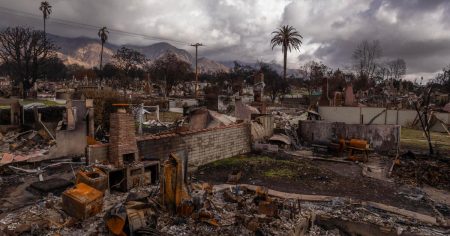Mass Layoffs at USAID’s Humanitarian Aid Bureau Spark Concern and Confusion
Dozens of Officials Terminated Despite Assurances of Continued Aid
In a shocking and abrupt move, dozens of officials at the U.S. Agency for International Development’s (USAID) Bureau of Humanitarian Assistance (BHA) received termination notices over the weekend. This came despite earlier assurances from Secretary of State Marco Rubio that the agency’s "core lifesaving medicine, medical services, food, shelter, and substance assistance" would be preserved. The layoffs have left employees confused, concerned, and questioning the future of U.S. humanitarian efforts worldwide.
The terminations began late on Friday night, with personnel officers at USAID sending out termination letters to BHA employees. Copies of these letters, obtained by ABC News, revealed that the notices were issued without prior warning, leaving many employees scrambling to understand their next steps. Serena Simeoli, a Humanitarian Aid Adviser to the Military at BHA, shared her experience, stating that she received a termination letter that was not addressed to her by name or contract number, leaving her uncertain about her status.
BHA’s Critical Role in Global Humanitarian Relief
The Bureau of Humanitarian Assistance is the U.S. government’s lead federal agency for international emergency disaster relief. It works closely with the military to provide humanitarian aid in the aftermath of natural disasters such as earthquakes, typhoons, hurricanes, and other global crises. Simeoli, who has been part of a small team of approximately 60 employees, emphasized the critical work of her team, which has assisted in responding to "sudden-onset disasters, complex emergencies," including earthquakes in Haiti and Syria, typhoons in the Philippines, hurricanes in the Caribbean, and conflicts in the Middle East and Ukraine.
The abrupt termination of these officials has raised alarms about the U.S.’s ability to continue its humanitarian efforts. Simeoli expressed her concern, stating, "Without BHA, it is going to be very challenging for the U.S. to play a meaningful role in global emergency relief, and I think I’m a little scared to think how it might go without us." She further warned that the importance of their work will only become fully apparent when the next catastrophic disaster strikes.
Employees React to Sudden Terminations with Shock and Disappointment
The recent layoffs have left many employees feeling betrayed and disheartened. Simeoli, who has dedicated much of her life to the organization, shared her emotional response, saying, "I’ve devoted so much of my life to this organization… I would work around the clock because I believed in what we were doing. It’s pretty painful to see and to be a part of what’s been happening."
Another former BHA official, who chose to remain anonymous out of fear of retaliation, echoed Simeoli’s sentiments. This individual, a former Marine, reflected on their years of service, responding to some of the world’s most challenging natural disasters. They expressed their dismay, stating, "It makes me seriously question why I dedicated my entire adult life to carrying water in the most dangerous places in the world for our government and its people."
Contradictory Assurances from Secretary Rubio
In late January, Secretary of State Marco Rubio issued a memo stating that he would grant an emergency waiver to allow USAID’s humanitarian missions to continue. However, he noted that the resumption of these efforts was "temporary in nature." This contradictions the recent terminations, leaving many to wonder about the future of U.S. humanitarian aid.
When ABC News reached out to the State Department for comment, they did not immediately respond, further fueling confusion and speculation about the decision-making process behind the layoffs. The sudden terminations have left employees and supporters of USAID questioning the commitment of the U.S. government to its humanitarian missions and the implications for global disaster relief.
A Call to Action for Transparency and Accountability
The layoffs at BHA have sparked widespread concern among current and former employees, as well as the broader humanitarian community. Many are calling for greater transparency and accountability from the U.S. government regarding the handling of humanitarian aid programs.
As the world continues to face growing challenges such as climate-related disasters, conflicts, and other crises, the role of agencies like BHA becomes increasingly critical. The abrupt termination of experienced and dedicated officials not only undermines the U.S.’s ability to respond to these challenges but also sends a discouraging message to those who have devoted their lives to humanitarian work.
In the words of Serena Simeoli, "The work that we do matters, and we won’t know how much it matters until we’re presented with another catastrophic disaster." As the U.S. grapples with the implications of these layoffs, it is imperative to reflect on the value of humanitarian aid and the importance of preserving the expertise and dedication of those who make it possible.
The Human Cost of Layoffs and the Uncertain Future of Humanitarian Aid
The recent layoffs at USAID’s Bureau of Humanitarian Assistance have left a trail of uncertainty and despair among employees and supporters alike. The sudden termination of dedicated officials, many of whom have spent years working in high-stakes, life-saving roles, raises serious questions about the U.S. government’s commitment to global humanitarian efforts.
As the world continues to grapple with increasing natural disasters, conflicts, and other crises, the need for effective and compassionate humanitarian aid has never been greater. The termination of these officials not only disrupts critical operations but also sends a demoralizing message to those who have dedicated their lives to helping others.
In the face of these challenges, it is essential for the U.S. government to provide clarity and reassurance about the future of its humanitarian programs. The men and women of BHA have given their all to serve some of the most vulnerable populations around the world. Their work matters, and so does their future.
As the humanitarian community mourns the loss of this critical expertise, one thing is clear: the U.S. cannot afford to step back from its role in global emergency relief. The stakes are too high, and the consequences of inaction could be catastrophic.
The world is watching, and it is time for the U.S. government to reaffirm its commitment to humanitarian aid and the dedicated individuals who make it possible. The future of global disaster relief depends on it.















